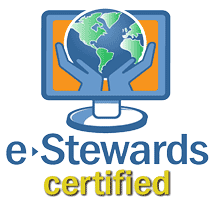My students are currently working on their discovery night project - this is an assignment where they present a real life problem to a community of adults - family, other teachers, friends - the forum is open to anyone that wants to come.
Our class is tackling the issue of electronic waste.
Much more on their learning and presentation will be coming up - the big night is Thursday - but I wanted to share one specific experience we had this week.
Our students have learned about the problems about recycling e-waste: It's expensive, difficult, and toxic. We also learned that many of the would-be recyclers actually ship their electronics to places that have much lower standards for worker safety and environmental protection. These places, such as Agbogbloshie, Ghana and Guiyu, China, pay workers less than a dollar per day and in the process destroy their own health and environment. Electronics are burned so that precious metals can be salvaged, and no protection is given to the workers. Students also learned many of these places use children younger than them to do this work.
One student was particularly bothered by this and decided to see what the recycling places he researched were doing about this.
He had a list of recycling locations and decided to start making calls.
Now if you know anything about teenage boys, you know talking on the phone to strangers ranks just below shoe shopping in 'high level interest activities.'
However, here was this 8th grade boy calling various companies and asking about how they handle the electronic items they 'recycle.' Here was a typical conversation:
Student: Hi, I'm a student calling about electronic waste. What do you do with the items you recycle?
Rep: We reuse the items we can and recycle the ones we can't.
Student: but how do you recycle it?
Rep: What do you mean?
Student: Like do you ship it to Ghana or China or do you recycle it there?
Rep: That is proprietary information, I can't discuss that.
This, of course, led to a nice discussion on what this meant. It also led to a very angry student.
But this anger also led to a discovery that there are responsible e-cycling standards. From there all the students in the class began to look for two different standards: R-2 and e-stewards recycling standards. They'd call companies and ask if their organization was certified by either of those standards. Most of the time the company had no idea what that meant.
Students started telling the representative that their organization should seriously look into getting certified. Suddenly the students felt they knew more than the adults. They were sharing information with adults. And nothing makes a student feel more powerful than that.



No comments:
Post a Comment